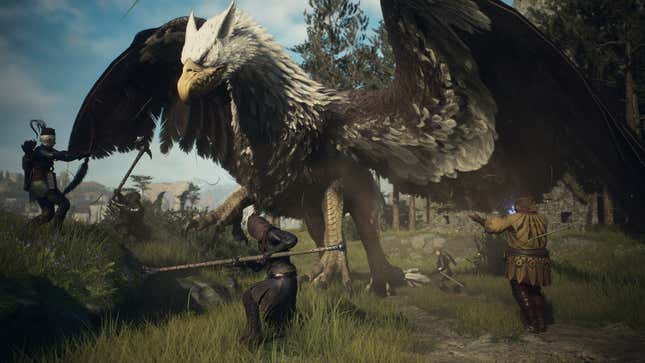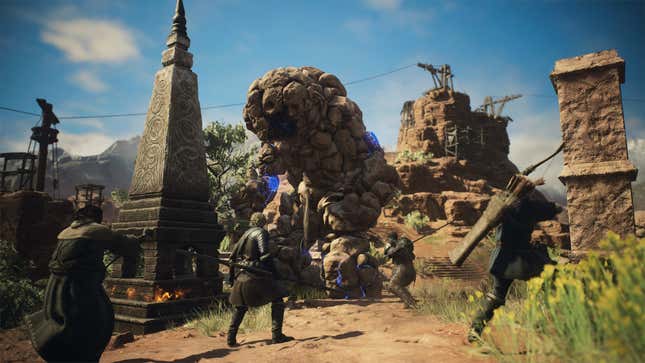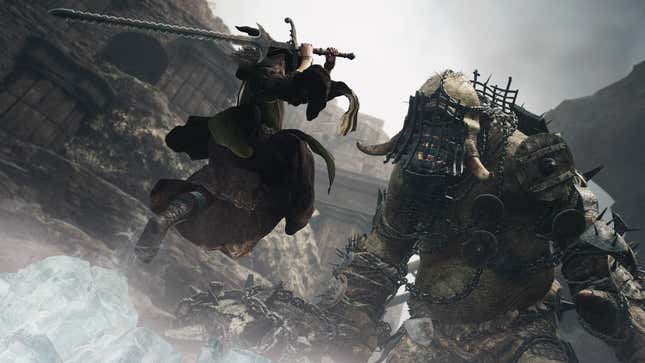
There’s a misconception that pops up in the world of video games—often when talking about games derived, in one way or another, from From Software’s genre-defining Demon’s Souls and Dark Souls—about the difference between “difficulty” and “struggle.” The Souls games, to be fair, traffic in both: Their infamously taxing boss fights often require feats of strenuous dexterity from players to advance their stories of guttering lights traversing a fading world, inflicting serious spikes of difficulty as a matter of course. But From’s games, and their imitators—of which 2012's Dragon’s Dogma, and now its 2024 sequel, Dragon’s Dogma 2, remain two of the most fascinatingly, weirdly ambitious—are far more interesting when they put their focus on struggle. On the strenuous nature of moving through a world teetering on the brink of ruin, and the legendary efforts required to pull it back from the brink of annihilation.
Set, like the first game, in a world where brief periods of peace are periodically disrupted by the arrival of vicious, mystically empowered dragons, Dragon’s Dogma 2 will make you feel that struggle from the jump, as your player character, the Arisen, awakens in the depths of a hard labor camp. Even after you effect your escape, though, you’ll find that the kingdom of Vermund is a hard place to live: Human settlements are sparse, the roads are crammed with monsters, and even the shortest of jaunts can find itself interrupted by a rampaging boss monster that towers over your brave crew of adventurers. And wandering around at night? Might as well leave a suicide note before you go.
Buy Dragon’s Dogma 2: Amazon | Best Buy | Humble Bundle
Like its predecessor (but unlike most Souls-type games, which tend to focus their level-building toward more granular aims) Dragon’s Dogma 2 is functionally an open-world game—but one where the vast expanses of space on offer are meant to intimidate and overwhelm, not to provide a canvas for half-attentive box-checking. Rather than throwing eight million map icons at you and daring you to collect ’em all, Dragon’s Dogma 2's map makes the mere act of getting from one town to another a genuine ordeal. Notably, the game makes fast travel a risky, expensive option: Sure, you can pay an oxcart driver to get you from one town to another, but they eat large portions of the in-game calendar (mostly important for managing quests), and they’re prone to attacks while you’re busy dozing off so you can speed forward the clock. (We had one road trip through hostile territory end with a gigantic ogre dropkicking our cart to splinters halfway to our destination; the next 20 minutes were a desperate marathon back to civilization’s warm glow.) Teleportation magic, meanwhile, is in strictly limited supply, with the game’s basic “warp between cities” item costing more to purchase for a single use than you’ll earn in the first several hours of play.
The effect of all these very deliberate choices, flying in strict contravention of “good” modern game design, is a return to a welcome sort of moment-to-moment hostility, of the sort that can leave you staring at the game’s beautifully rendered maps for long minutes, trying to figure out the least disastrous route through the wilderness. The addition of a “loss” effect that steadily lowers your maximum health when you get hurt too badly, or are forced to respawn—and which can only be recovered by camping with special equipment, or paying out the nose for a stay at an inn that might be a 10-minute hike away—only emphasizes how much Dragon’s Dogma 2 wants you to feel every hard-won mile.

And yet, at the same time, we can’t bring ourselves to call the game difficult—most especially because of the return of the original game’s most notable feature: The Pawns, AI-controlled helpers that accompany you everywhere, helping you fight off monsters and accomplish quests. Built from the game’s simple but fun character class system, and supplemented by outside hires from other players online, your Pawn crew allows you to roll four deep through the wilderness and dungeons of Vermund, taking huge amounts of pressure off your player character. (Playing through the game primarily as a magic user, we couldn’t have survived without our legion of cheerful meat shields, buying us time to build up satisfyingly massive magic spells and unleash them on the next dumbass goblin who looked at us funny.) It’s one of several places where Dragon’s Dogma reveals it as a spiritual cousin to Capcom’s Monster Hunter games, which also exult in the joys of taking down gargantuan beasties in teams of four. (Even if DD2, like the original, doesn’t offer actual multiplayer, just you and your Pawns.)
Pawns are the answer to many of the problems Dragon’s Dogma 2 very deliberately sets for itself, helping out in combat, area navigation, and even the completion of quests, which can otherwise be frustratingly ambiguous; your in-game journal might not know where you’re supposed to go next to keep an appointment or catch an evil-doer, but chances are one of your Pawns can point you in the right direction (especially if you’ve hired them from a player who’s already completely said quest). It’s not a perfect system, though, for reasons both extrinsic and intrinsic. On the one hand, the game’s pathfinding isn’t always perfect, especially when you’re out in the world—a potentially fatal glitch when so much of combat relies on having back-up to keep you from getting stunlocked or overwhelmed by monsters. And then, well… how do we say this without being mean?
Pawns can also be annoying as fuck.

This wouldn’t matter overly much, if they weren’t with you all the time, and if something like 50 percent of all the audio in Dragon’s Dogma 2 wasn’t some flavor of Pawn nattering. But they are, and it is, and it can definitely start to grate when you’re deep in a wilderness sojourn and one of your hirelings pipes up to notice, for like the dozenth time that day, that all your pawns are currently sporting a separate vocation. “’Tis a pity we can’t share equipment!” ‘Tis it, ViolenceGuy_67? ‘Tis it? (That’s before you even get into the topic of “dragonsplague,” a feature we only encountered in passing during our 30 hours with the game, which can supposedly drive the pawns to increasing acts of hostility toward their player character lords. In our experience, it just made them rude, but the idea—which plays in nastily fun ways with DD2's love of ambiguity and mystery—was scary enough to give us repeated pause.)
But we digress/vent. For all its irritations, the Pawn system serves to differentiate Dragon’s Dogma 2 from pretty much every Souls-like that isn’t Dragon’s Dogma 1—a game Capcom pretty clearly feels wasn’t especially in need of fixing, given how closely it’s stuck to its template a dozen years later. Fighting is still chunky and slow, with the unique ability to clamber all over bigger enemies, or chuck smaller ones (or, y’know, the local citizenry) around like ragdolls. The world is still tinged with a deep layer of apocalyptic melancholy. Even the game’s plot beats mirror many of those from the first, which hid a far stranger and sadder story beneath its generic fantasy veneer.
No one who plays Dragon’s Dogma 2 for more than half an hour could deny that it’s a messy game. It inherits many of its predecessor’s flaws, along with its strengths—most notably its writing, which, even when applied to characters who aren’t the deliberately personality-deficient Pawns, can be hollow, stilted, and dull. And it can never quite shake the feeling that its gigantic, complex world is teetering right on the edge of this engine’s ability to render it convincingly. Even so, it’s the mess of almost limitless, nigh-arrogant ambition, a game willing to frustrate, confuse, or stress out its players in pursuit of a deeper emotional connection with its vast, hostile world. It fundamentally refuses to follow any tune but its own—which inevitably means it can go places, and accomplish things, that the player is unlikely to expect.
Buy Dragon’s Dogma 2: Amazon | Best Buy | Humble Bundle
.